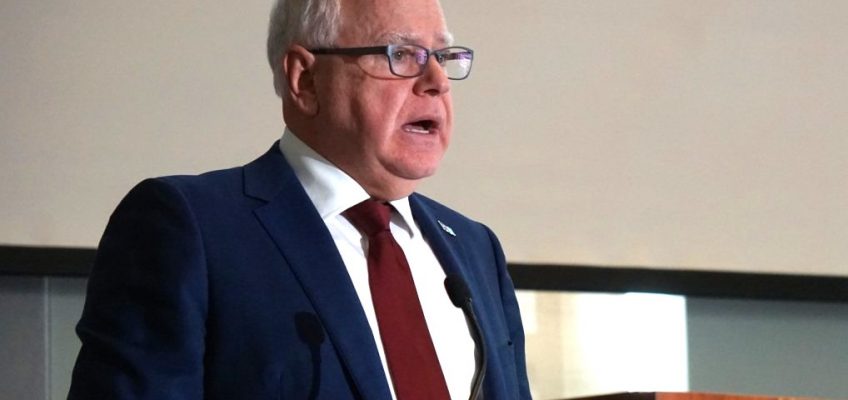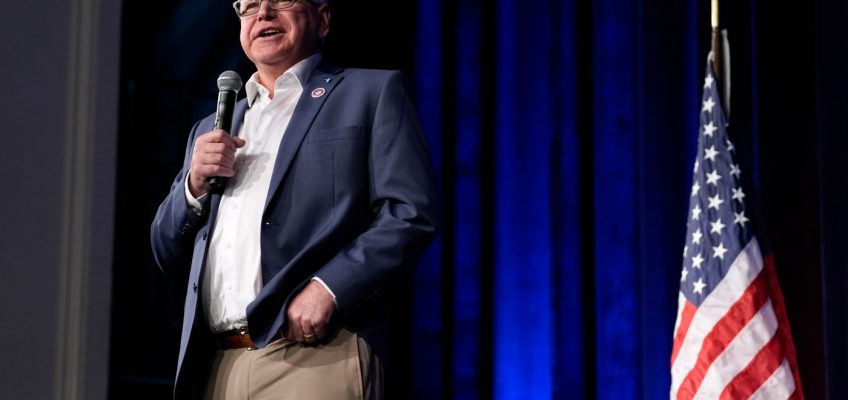Doing what the party wants
Tim Walz has been Minnesota governor since 2019. He has been elected twice with just over 50% of the vote. In the time as governor he certainly has been in the news often.
The George Floyd riots in the spring of 2020 gave the governor a chance to show strong leadership for Minnesota; many think it was his absence from leadership that extended the riots that brought him into the news cycle.
Covid – what a tough time to make decisions but the governor was present in most news coverage.
Take the 2023 legislative session where the Democrats held the governorship and both houses of the Legislature — the trifecta as it was called. In that session Minnesota had an $18 billion surplus and the governor and his Legislature spent it all and raised the biennial budget from $52 billion to $72 billion (a 38% increase). The governor said on the news that he was very proud of this session and its productivity.
Fraud in state government the past five years during the Walz administration has been in the news often with the Feeding our Future scandal leading the way, along with others, totaling almost a half billion dollars. The governor has come out in the press to say this has to be addressed. Kind of like close the barn door after the horse is out.
In 2024 the Governor pursued nomination to run as VP; he got it and was in the national news constantly and absent from Minnesota for four months.
In 2025 the Minnesota legislative session was called to order and for the first three-plus weeks only the Republicans showed in the House of Representatives; thought the governor might show up to try to resolve the dispute that kept his party away from the Capitol, but I thought wrong.
Seems the governor is now taking his direction from new national Democratic Party Chair Ken Martin, leaving the state and touring other states and visiting congressional districts where the seat is held by a Republican and promoting his party’s agenda.
I guess this is just the way politics is, once you are elected you do what the party wants and not pay much attention to the needs of people (all people) in your state or district.
I hope we elect a person governor who shows they are a leader focusing on Minnesota issues and not what their political party leaders dictate.
Tom Troskey, St. Paul
I guess I am safe?
I read with horror that Pete Hegseth, Elon Musk, Donald Trump or their proxies are removing Pentagon references to D.E.I. because they don’t believe in their importance. I was somehow drawn back to memories of the Taliban blowing up World Heritage Sites because some of those sites represented beliefs disparate from their own. But then I considered that, well, Hegseth and the others were not actually blowing things up but only “removing” images.
And of course they also are not prosecuting or “removing” me from my family, they are only threatening other persons with prosecution who have challenged their beliefs. So I guess I am safe?
Kenneth Gilmore, Oakdale
‘Declaration of Conscience’
We need another Margaret Chase Smith. In the late 1940s to the mid 1950s there was a period referred to as the “Red Scare” and McCarthyism. During this time, Republican Wisconsin Sen. Joseph McCarthy rose to power. He presented himself as the only salvation against Communist infiltration and used the tactic of fear to maintain power. His M.O. was a rapid fire of accusations that a person was a Communist without evidence while shielding himself against reprisals due to Senate immunity.
The first person to take a stand against Sen. McCarthy was Maine Republican Sen. Margaret Chase Smith. On June 1, 1950, Sen. Smith took to the well of the Senate floor and gave a speech, “Declaration of Conscience.” Sen. McCarthy’s name was never used and was implied. Sen. Smith expressed her concern about a psychologically divided country, witch hunts that allowed multiple innocent people to be smeared, that we allowed ourselves to be tools of totalitarianism techniques of confuse, divide and conquer and the prevalence of fear, ignorance, bigotry, and sensationalism as innocent people were attacked and recipients of trial by accusation with no recourse.
Sen. Chase made a plea to recapture our unity and to promote the stalwarts of democracy: the right to protest, to hold unpopular beliefs, to criticize and right of independent thought. This speech was signed and concurred wotj by six other Republicans. Sen. Smith for four more years continued to speak up against McCarthy at great political risk. Finally in1954 the Senate censured Sen. McCarthy for improper conduct and he lost power and faded away.
Who will be our next Margaret Chase Smith?
Geri Minton, Roseville
For the long haul
Thanks to the Prairie Island Indian Community for being a stalwart friend of Grey Cloud Island. They are guided by such noble values and are fully committed to the preservation of cultural treasures and natural spaces. Their wisdom and spirit of generosity inspire us.
The Prairie Island Indian Community has never hesitated to help Grey Cloud Island, the smallest township in Minnesota, in our battle against Holcim, a multi-billion-dollar international company always seeking ways to extract more rock (a.k.a. blow the island to smithereens). Again and again, Holcim has tried to change our mining setbacks and blast closer to homes, despite the grave concern of residents.
Through it all, Prairie Island has been a voice of reason, contributing an historical perspective that far surpasses Holcim, who will one day complete their extractions, pack up and never return, leaving behind irreversible damage: a giant hole in our island.
Our friendship with Prairie Island has been a lifeline. Specifically, we owe a debt of gratitude to Shelley Buck and Barry Hand for their kindness and camaraderie. We also applaud Tribal Council President Grant Johnson for his leadership.
Grey Cloud Island is a sacred site for the Prairie Island Indian Community. It is home to the largest concentration of burial mounds in Washington County. Prairie Island has been an invaluable resource as we strive to preserve these artifacts. They are our teachers and our friends.
Ted Ries, Grey Cloud Island resident
Letters: I have Trump Derangement Syndrome and here is the cause
Letters: Maybe Minnesota should become Canada’s 11th province
Letters: How ’bout you start with your own budgets, budget-cutters?
Letters: The taxing cost of living in Minnesota
Letters: ‘It doesn’t cost anything to be nice to someone’




